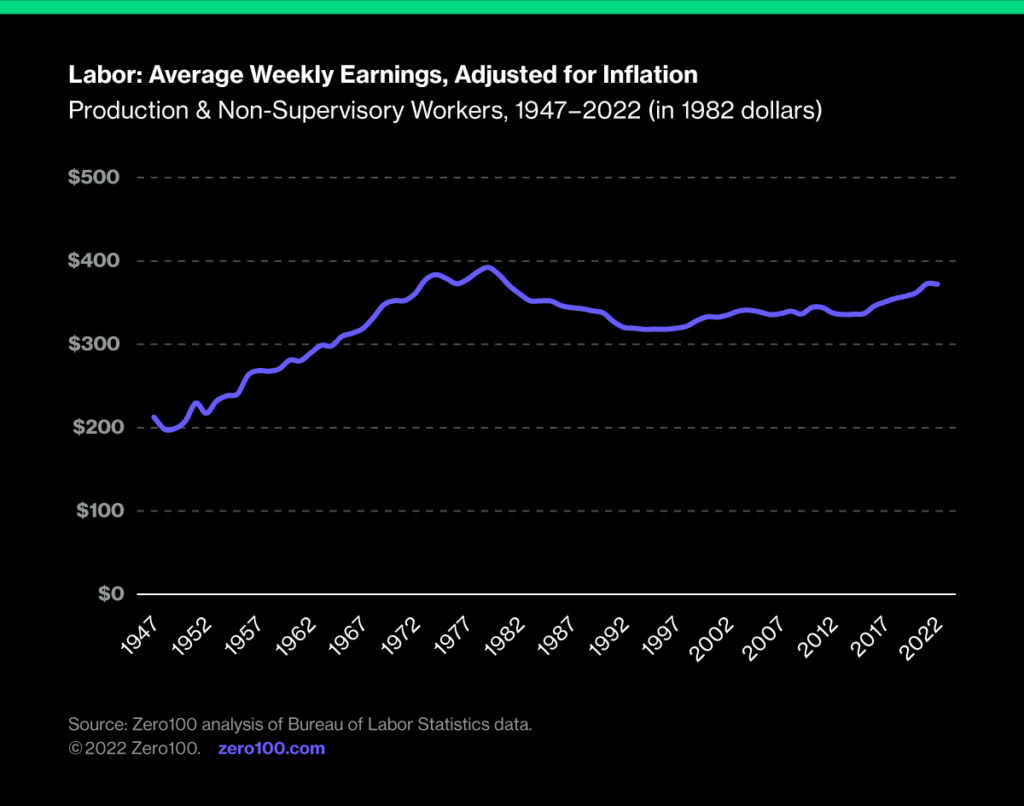I'm finishing some research on “must-have” skills for Zero100 supply chains in 2030 and the findings show a balanced mix of extreme left-brain stuff (hard sciences, quantitative methods) and fluffy sounding right brain stuff (empathy, storytelling). The most interesting takeaway, however, is that building an amazing Team-of-Tomorrow is more about breaking down walls between blue collar and white collar jobs than hiring Data Scientists.
Job data this week shows how hard we are still looking for people, which got me thinking: supply chain leaders should be looking for solutions to the talent problem in their own warehouses, factories, and retail stores.
Truck Drivers and Publishing Interns
The huge demand for truck drivers, cashiers, and retail associates has been a story ever since COVID hit, but its roots go back to mid-20th century struggles between “workers” and “management”. The tension then was less about money than respect and the two sides, egged on by the Big-Three in Detroit and their nemesis the UAW, approached work as something to fight over. Blue collar vs. white collar was a social justice battle despite wages that were pretty darn good by today's standards.
Meanwhile, in places like New York City, highly educated and generally well-off young professionals are eagerly taking unpaid internships in publishing houses, galleries, and other appealing sounding businesses because they are keen to learn and get started in careers they can be proud of. The pay differential reflects not only that the work on supply chain's front line is generally harder, but also that too few of these jobs lead to the exciting, long-term careers that people dream of.

I have argued before that these workers are in-effect demanding a one-time pay raise, having survived “essential worker” status during COVID. This is needed, but maybe it's not as important as respect. Considering that inflation adjusted pay for “blue collar” workers isn't miles away from the highs seen in the ‘70's, perhaps the unlock is also about creating compelling career options that start behind the wheel of a delivery van or packing boxes in a warehouse.
Meet Becky Gansert
I once had the great pleasure of not only meeting but getting to do some amazing event work with Becky Gansert, Vice President, Global Specialty Fulfillment at Amazon. She joined me on stage at the Ryman Theatre in Nashville (a.k.a., the Gran' Ole Opry) in front of 1000 university students hosted by Amazon to hear about exciting career opportunities in, you guessed it, supply chain.
The audience was enchanted. A big business executive blending smarts, power, and humility – of course they were impressed. But what impressed me most is that Becky had started in a fulfillment center while an undergrad in 1998. The takeaway for any college kid is crystal clear: you can start out getting paid by the hour in a warehouse and end up on the big stage, both literally and metaphorically.
At the heart of this story is a deep respect for operations and supply chain. Becky is a massive success, but she is not a unicorn. Supply chain leaders with an eye for talent see it every day in their operations, and the smart ones know how to cultivate this talent pipeline systematically. Colgate Palmolive's Chief Supply Chain Officer, Mike Corbo, says of the talent puzzle, “the big opportunity is to convert your existing workforce”, even if that means tangling with HR policies that require a college degree for management roles.
Even More Important for Zero100 Supply Chains
The idea of working your way up from the shop floor is not new. The early boom years of the auto industry were built on “car guys” who knew their way around a machining center. But something was lost over 25 years of globalization and outsourcing which seems to have dulled the respect some senior leaders feel for blue collar workers.
Today, as digitization and decarbonization force CEOs to look ever more carefully at the physical realities of how we make and move things, maybe those closest to the work will get a chance to shine. The ‘machine whisperers' who fine tune our shop floor operations may be the key ingredient to building sustainable supply chains.
Critical Reading
THE NEW YORK TIMES
Tech Companies Slowly Shift Production Away From China
Commentary: In response to growing geopolitical tensions and pandemic-induced supply chain disruptions, tech companies including Apple and Google are shifting work out of China to nearby countries.
#china #tech
GREEN BIZ
EV Manufacturer Polestar Joins Electric Boatmaker Candela For New Voyage
Commentary: The multi-year agreement has been hailed a “world first” between the electric automotive and marine industries. The companies hope the partnership will propel the growth of sustainable electric mobility in society.
#electric #transportation
REUTERS
Amazon Introduces Seller Storage Service To Tackle Supply Chain Woes
Commentary: Amazon Warehousing and Distribution (AWD), has been launched to help sellers store bulk inventory and ease distribution. In 2023 the pay-as-you-go service will expand to allow seller to send inventory to wholesale customers or brick-and-mortar stores as well.
#amazon #inventory
